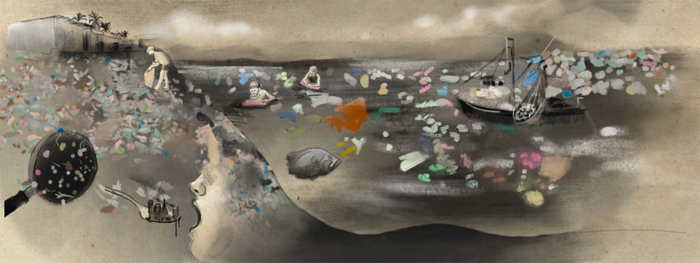Many people are aware of plastic pollution in the oceans. Photos of turtles or seabirds entangled in plastic garbage first went viral in the 1990s, and the Great Pacific Garbage Patch is now the focus of highly publicized cleanup efforts.

Credit: Mari Shibuya
Many people are aware of plastic pollution in the oceans. Photos of turtles or seabirds entangled in plastic garbage first went viral in the 1990s, and the Great Pacific Garbage Patch is now the focus of highly publicized cleanup efforts.
Less recognized is how marine plastic waste affects human populations, and the unequal burden on different communities. A report, “Towards an Equitable Approach to Marine Plastics Pollution,” outlines the current situation and attempts to address the problem.
“We all benefit from plastics, but some people are paying more of the external costs in terms of the environmental damage, well-being issues and just horrendous scenes that they must live with in places they call home,” said project leader Yoshitaka Ota, a University of Washington professor of practice in marine and environmental affairs and director of The Nippon Foundation Ocean Nexus Center.
Increasingly, the greenhouse gases causing climate change are seen as an issue in which some countries produce most of the pollution while other countries or groups are more at risk from the long-term consequences. Plastic pollution, this report argues, is a similar issue for coastal communities.
The report, published in late November, includes 31 authors from nine countries. It incorporates case studies and analyses from around the world as well as larger, overarching recommendations for change.
The authors conclude that coastal communities most affected by marine plastic pollution should be better represented in drafting potential solutions. A free, virtual event in March will bring together stakeholders from around the world to draw up a road map for an equity-focused path to address marine plastics.
The Ocean Nexus Center was founded in 2019 as a 10-year initiative based in UW EarthLab that includes more than 20 member universities and organizations around the world. Its mission is to bring together equity and justice in the oceans on a global scale.
The recently published report covers topics such as:
- A call to replace the term “plastic litter” with “plastic pollution.” The word “litter” frames the issue on a small scale that can be addressed with better waste collection, disposal or recycling, rather than broader industry-wide changes to production.
- A discussion of the rise in plastic waste during the COVID-19 pandemic, through masks, gloves, face shields and a resurgence of single-use and individually wrapped products.
- Chapters that provide place-based case studies, including interviews with local residents about their experiences with marine plastics. Locations include a fishing community in Ghana, coastal mangrove forests in Ecuador, and an island in southern Japan that includes both tourists and local residents.
- Two analyses of waste cleanup programs — Washington state’s Marine Debris Action Plan and the “Fishing for Litter” program in the Netherlands.
- A section with multiple authors focused on the island of Aotearoa, New Zealand. Maori perspectives have been disregarded in efforts to address marine plastic pollution, authors write, despite the greater impact and importance of marine environments for Maori people’s livelihood and culture.
- A review of international rules for plastic waste disposal — a patchwork of regulations including the Basel Convention, a nonbinding agreement that the U.S. has not signed.
- A critique of Coca-Cola Co.’s “World Without Waste” initiative as an example of industry-backed solutions to marine plastic pollution that focus on individual consumers, rather than bigger, more permanent solutions that could reduce plastic waste.
“Coca-Cola is the world’s biggest producer of plastic waste, and it serves as a case study of how multinational corporations engage in waste reduction and corporate social responsibility,” said lead author Jessica Vandenberg, a UW postdoctoral researcher in marine and environmental affairs who wrote the analysis of Coca-Cola’s initiative.
“As we highlight in the report, one of the key actions we see as imperative for addressing marine plastic pollution is refocusing the problem as one of plastics production, rather than as an issue of waste management,” Vandenberg said.
Mari Shibuya, a Seattle-based artist, created digital watercolor paintings that appear throughout the document. The report is funded by The Nippon Foundation and is intended to be an accessible, comprehensive summary of the issue that can be read by policymakers, educators and other audiences, Ota said.
The March event will bring together audiences to implement the report’s main recommendations. Visit The Nippon Foundation Ocean Nexus Center website to find forthcoming event details.
###
For more information, contact Ocean Nexus marketing and communications lead Ariel Wang at [email protected], Ota at [email protected] or Vandenberg at [email protected] (note: Vandenberg is currently a visiting scholar at Wageningen University & Research in the Netherlands, on Central European Time).




